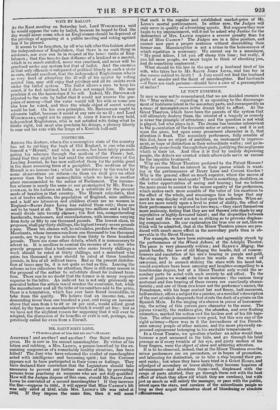VOTE BY BALLOT.
• AT the Kent meeting on Saturday last, Lord WINCHILSEA. said he would oppose the vote by ballot, because he hoped to God the day.would never come when an Englishman should be deprived of the privilege of appearing at a public meeting and voting against him if he pleased. It seems to be forgotten, by all who talk after this fashion about the independence of Englishmen, that there is no such thing in existence, nor ever can be in respect of the lower ranks of Eng- lishmen; that this face-to-face defiance of a landlord or a master, which is so much extolled, never was practised, and never will be practised under any system but that of ballot. And the enemies of that only efficacious safeguard of political liberty in such a state as ours, should recollect, that the independent Englishman who is so very fond of attracting the ill-will of his master by voting against him, may still enjoy that privilege and all its sweets even under the ballot system. The ballot allows a man to keep his secret, if he feel inclined, but it does not compel irirn. He may proclaim it on the house-tops if he will. Indeed, Mr. BROUGHAM objected to the vote by ballot that it would not answer the pur- poses of secrecy—that the voter would tell his wife or some one else how he voted, and thus the whole object of secret voting would be lost. On his own principles, Mr. BROUGHAM ought to advocate ballot, because it could at any rate do no ill ; and Lord WINCHILSEA ought not to oppose it, since it leaves to any bold, independent Englishman, who is not satisfied with doing what he thinks right, but must also proclaim his doings, a plenary liberty to roar out his vote with the lungs of a Kentish bull-calf'.


























 Previous page
Previous page